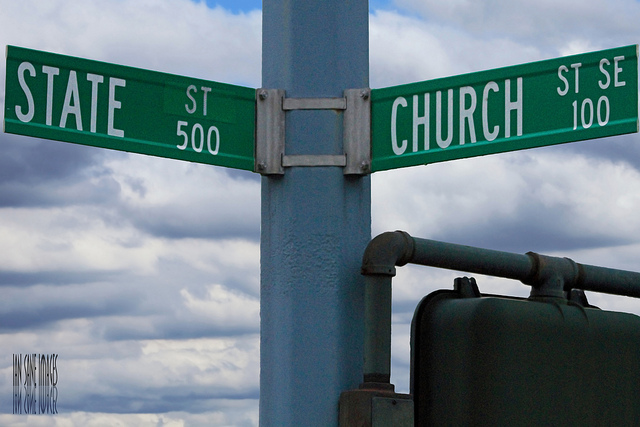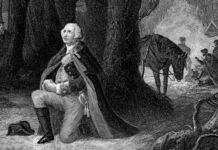For a discussion of jurisdictions, see Part 1 of this series “Getting to Know Your Church-State Jurisdictions.”
One way to keep Christians out of the public arena, especially in the realm of politics, is to claim that there is a separation between Church and State which when interpreted and applied by courts and organizations like the American Civil Liberties Union and Americans United for Separation of Church and State means a radical separation of religion and civil government. The argument is based on the assumption that in biblical times Church and State were merged, and in modern times the First Amendment separates the two institutions. Supposedly, under biblical law, priests ruled over elders, judges, and kings. If this is the case, so the argument goes, the Bible cannot be used in our modern pluralistic society where the Constitution forbids the State to be ruled by ecclesiastical officers. Of course, as we will see, Church and State were not merged in the Bible, and the Constitution does not mention a Church-State separation because the institutions were already jurisdictionally separate in the colonial era. Max I. Dimont, writing in Jews, God, and History, offers a helpful summary of the biblical position on jurisdictional separation:
In the Mosaic Code the civil authority was independent of the priesthood. Though it is true that the priesthood had the right to settle cases not specifically covered by Mosaic law (Deuteronomy 17:8–12), that did not place it above the civil government. The priesthood was charged with the responsibility of keeping this government within the framework of Mosaic law, just as the United States Supreme Court is not above the federal government but is, nevertheless, charged with the responsibility of keeping it within the framework of the Constitution.[1]
In Israel, the torah (law) was viewed as the authority for all three governments: family, church, and state. While the standard of law was the same, not all laws could be applied in the same way under each jurisdiction. For example, a father could discipline his own child for an infraction, but he could not discipline another family’s child, excommunicate a church member, or impose and carry out the death penalty on a criminal who committed a capital crime. While the State has the authority to try and execute convicted murderers and impose other civil penalties, individuals, families, and churches do not.
None of this means that an individual church member cannot use the Bible to determine whether a candidate running for political office is fit for that office. The Constitution does state that no religious test can be given to someone seeking public office at the Federal level (Art. 6, sec. 3). This article refers to governments supplying the test, most probably designed to keep denominational distinctives from being imposed uniformly by the national government.[2] Some scholars claim that since the Constitution requires an “oath or affirmation,” and “an oath imposes a sacred obligation,” therefore “an oath requirement could be characterized as a ‘religious test.’ Nineteenth-century church historian Philip Schaff wrote, ‘in recognizing and requiring an official oath’ for both state and federal officeholders, ‘the Constitution recognizes the Supreme Being, to whom the oath is a solemn appeal.’”[3] It seems that George Washington, a constitutional participant, and our nation’s first president, understood the oath in this way since he took it with his hand on the Bible and is reported to have added, “so help me God.” Some of the constitutional delegates pointed out the religious nature of an oath.[4]
The Constitution does not prohibit individual voters from developing their private test for those running for political office. Our founders, because they either directly referenced the Bible and its moral requirements (boundaries), or they borrowed (“smuggled”) these moral principles into their secular worldview to make it work. They knew that without them there was no way to account for morality and thus no way to build a political system that would outlast them.

Myths, Lies, and Half-Truths
Our nation is in a crisis. The world is crying out for answers in the face of bewildering and seemingly unsolvable problems. Myths, Lies, and Half-Truths shows that the Bible has real answers to these problems — answers the church is currently ignoring.












